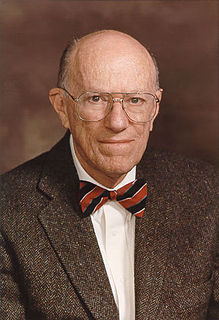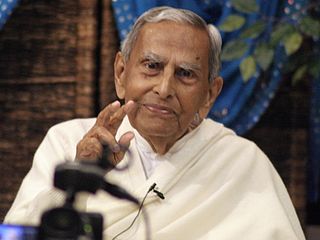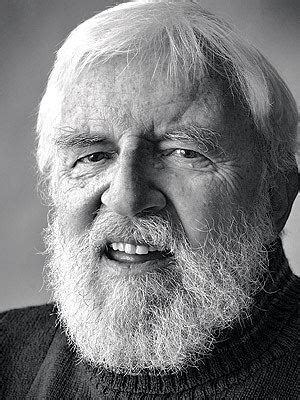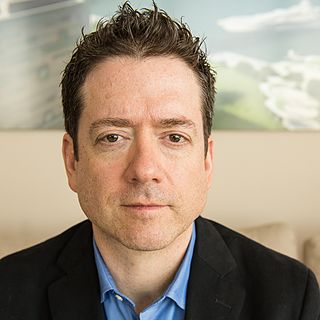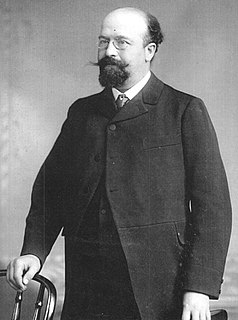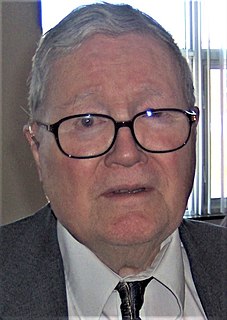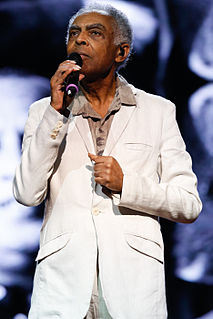Top 1200 Societies Quotes & Sayings - Page 20
Explore popular Societies quotes.
Last updated on April 22, 2025.
There have, for years, been comparative studies of religious fanaticism and factors that correlate with it. By and large, it tends to decline with increasing industrialization and education. The US, however, is off the chart, ranking near devastated peasant societies. About 1/2 the population believe the world was created a few thousand years ago: the justification for the belief is that that is what they were ordered to believe by authority figures to whom they were taught one must subordinate oneself. And on, and on.
Drug use, some might say, is destroying this country. And we have laws against selling drugs, pushing drugs, using drugs, importing drugs. And the laws are good because we know what happens to people in societies and neighborhoods which become consumed by them. And so if people are violating the law by doing drugs, they ought to be accused and they ought to be
convicted and they ought to be sent up.
Every day, the humane societies execute thousands of dogs who tried all their lives to do their very best by their owners. These dogs are killed not because they are bad but because they are inconvenient. So as we need God more than he needs us, dogs need us more than we need them, and they know it.
It was a truism that all civilizations were basically neurotic until they made contact with everybody else and found their place within the ever-changing meta-civilisation of other beings, because, until then, during the stage when they honestly believed they might be entirely alone in existence, all solo societies were possessed of both an inflated sense of their own importance and a kind of existential terror at the sheer scale and apparent emptiness of the universe.
The Humane Society of the United States works with local Humane Societies across the country. We don't control every local Humane Society in this nation. These organizations strive to the greatest degree to provide homes for animals and to encourage adoption, to spay and neuter animals. And if a decision is made to euthanize, it is a failure of society, not the local organizations who are striving to do their best.
It is a mistake - as so many over-centralized socialist societies have discovered - to try to eliminate money as an incentive. Money is one incentive among many, and has its place. But to put no limits on the impulse to accumulate money obsessively is as destructive as to place no limits on the impulse to commit violence. A viable democratic society needs a ceiling and a floor with regard to the distribution of wealth and assets.
They that examine into the Nature of Man, abstract from Art and Education, may observe, that what renders him a Sociable Animal, consists not in his desire of Company, Good-nature, Pity, Affability, and other Graces of a fair Outside; but that his vilest and most hateful Qualities are the most necessary Accomplishments to fit him for the largest, and, according to the World, the happiest and most flourishing Societies.
To believe that man's aggressiveness or territoriality is in the nature of the beast is to mistake some men for all men, contemporary society for all possible societies, and, by a remarkable transformation, to justify what is as what needs must be; social repression becomes a response to, rather than a cause of, human violence. Pessimism about man serves to maintain the status quo. It is a luxury for the affluent, a sop to the guilt of the politically inactive, a comfort to those who continue to enjoy the amenities of privilege.
There is a class of persons to whom by all spiritual affinity i am bought and sold; for them i will go to prison, if need be; but your miscellaneous popular charities; the education at college of fools; the building of meeting-houses to the vain end to which many now stand; alms to sots; and the thousandfold Relief Societies; - though i confess with shame i sometimes succumb and give the dollar, it is a wicked dollar which by and by i shall have the manhood to withhold.
God is a compass. God is not about who you're sleeping with or, I mean, I don't care about that. It's about loving your neighbor. It's about living a life that's bigger than yourself. As time goes on, societies have a tendency to put themselves on the throne, and that leads to self-absorption and that leads to "life is all about me." And there's not a compass that sends you in a direction where life can't be just about you.
When we begin to understand the concept of Karma we will never ever blame God for anything that happens to us. We will realise that we are responsible for all that happens to us. As we sow, so shall we reap. Rich or poor, saint or sinner, miser or philanthropist, learned or illiterate ... This is the Universal Law that applies to individuals, to whole communities, societies, nations and races. As we sow, so shall we reap.
We of the richer societies, who have had access to more energy than we have the experience to wield intelligently are making decisions we are not qualified to make almost every time we enter the voting booth, go to the grocery store or step into a car show room. We do not know what is "normal." Because our whole life and in some respects a generation or two before us have only known this era of fossil fuel exploitation and resource grabbing; we call this normal.
Nature hates vacuum. Once a society is depleted of moral values, it creates a vacuum that will be filled by doctrines that hold to such values, even though those values are draconian and oppressive. In fact the more a society is devoid of morality, the more promising prudish and unpermissive doctrines look. Licentious societies create a spiritual vacuum that legalistic religions such as Islam fill.
There is an understandable vindictiveness in people who come from Communist countries. They want to keep telling us that we were fools to think that we could make radical changes in our society. Though I understand their dismay, respect their suffering and don't understand the gullibility of some people who don't take in how repressive these societies are, I still think it's important to keep people of all kinds as active in civic matters as possible.
Patriotism is as much a virtue as justice, and is as necessary for the support of societies as natural affection is for the support of families. The Amor Patriae love of ones country is both a moral duty and a religious duty. It comprehends not only the love of our neighbors but of millions of our fellow creatures, not only of the present but of future generations. This virtue we find constitutes a part of the first characters of history.
Casually, unconsciously, but with deadly effectiveness, western man all round the globe destroyed the traditional gods and the ancient societies with his commerce and his science. ... Does it mean nothing to him if great areas of the world, where western influence has been predominant, emerge from this tutelage unable to return to the old life, yet unfitted for the new? It is hard to believe that the future could ever belong to men demonstrating irresponsibility on so vast a scale.
In every human society of which we have any record, there are those who teach and those who learn, for learning a way of life is implicit in all human culture as we know it. But the separation of the teacher's role from the role of all adults who inducted the young into the habitual behavior of the group, was a comparatively late invention. Furthermore, when we do find explicit and defined teaching, in primitive societies we find it tied in with a sense of the rareness or the precariousness of some human tradition.
People use drugs, legal and illegal, because their lives are intolerably painful or dull. They hate their work and find no rest in their leisure. They are estranged from their families and their neighbors. It should tell us something that in healthy societies drug use is celebrative, convivial, and occasional, whereas among us it is lonely, shameful, and addictive. We need drugs, apparently, because we have lost each other.
If you are born a female and live as one, you can't deny your connection to feminism. I think if you are a female, you are a feminist. As far as my work goes, I don't want it to be interpreted solely from a feminist perspective, of course, but for a woman to have no interest in feminism or say that it doesn't concern her is self-denial. I know that sexism still exists within various societies and systems, whether blatantly or subtly. We are, however, much better off than previous generations.
I've got a solid grounding in history, sociology, anthropology, philosophy, etc etc. That means I actually have a good idea about how societies change and evolve. I know how a lot of them have actually functioned through the years. I can put together a culture that's cool and different, while still being logically consistent, so that it feels real. So many fantasy worlds are either implausible, cookie-cutter, or both. Mine aren't.
Myth is a tale once believed as truth; believed, it is not myth, but religion. A tale once religiously believed that has come to be called a myth is something of religion corrupted with disbelief. What are beliefs for some societies but myths for others cannot fill spiritual vacancies in the life of those others.
Another potentiality of our irrepressible juvenility is a capacity to maintain until the onset of senility an active creative interaction with our environment. We persist in exploring, investigating, inventing, discovering. In these respects humans of all eras, in all societies, all ages of life, are more like baby chimps and not at all like the sedate and rigidly conforming adult chimpanzee, who hasn't changed much since she was five or six years old.
Nearly half the earth's surface is unclaimed by any country, so seasteads would be startup countries on the blue frontier. Patri Friedman is a Google engineer and theorist of political economy who realized that if society floated, it would completely change the nature of governance itself. If seasteads are modular and can be moved about, allowing people to choose new societies, we'd create a market of governance providers, competing to attract residents.
This is an age of intellectual sauces, of essence, of distillation. We have conclusions without deductions, abridgments of history and abridgments of science without leading facts. We have animals for literature, Cabinet Encyclopaedias, Family Libraries, Diffusion Societies, and heaven knows what else! What is all this for? Not to add knowledge to the learned, but to tell points to the ignorant, without giving them the trouble to acquire the links. Oh! it is sad work. And the result will be injurious to all classes.
Nationality started as something natural, but we should not be restrained by the old politics that make up these clear lines. It should have its own way of evolving. In some places, it will evolve slower and in others, faster. It's like the mountains, the ocean and the rivers. It has its own geological forms. Societies cannot be flat. But during change, human rights, human dignity and free speech have to be protected. Otherwise, we'll be going backward.
Let's not use the term democracy as a play on words which is what people commonly do, using human rights as a pretext. Those people that really violate human rights [the West] violate human rights from all perspectives. Typically on the subject of human rights regarding the nations from the south and Cuba they say, "They are not democratic societies, they do not respect human rights, and they do not respect freedom of speech".
Advances in the technology of communications have proved an unambiguous threat to totalitarian regimes: Fax machines enable dissidents to bypass state-controlled print media; direct-dial telephone makes it difficult for a state to control interpersonal voice communication; and satellite broadcasting makes it possible for information-hungry residents of many closed societies to bypass state-controlled television channels.
The institution of marriage in all societies is a pattern within which the strains put by civilization on males and females alike must be resolved, a pattern within which men must learn, in return for a variety of elaborate rewards, new forms in which sexual spontaneity is still possible, and women must learn to discipline their receptivity to a thousand other considerations.
Thanks to Barack Obama, America is for the first time aligning its values with those of 'the majority of the world's population.' If you think the world's population has had better values than America, that is has made societies that are more open, free, and tolerant than American society, and that is has fought for others' liberty more than America has, you should be delighted.
Remember, until the 1970s, the spread of democracy has always been accompanied by the decline of inequality. The more democratic our societies have been, the more equal they have been becoming. Now we have the reverse tendency. The spread of democracy now is very much accompanied by the increase in inequality.
My definition of a decent society is one that first of all takes care of its losers, and protects its weak. What I see in my country, progressively over these years, is that the rich have got richer, the poor have got poorer. The rich have become indifferent through a philosophy of greed, and the poorer have become hopeless because they're not properly cared for. That's actually something that is happening in many Western societies. Your own, I am told, is not free from it.
Gandhi is the other person. I believe Gandhi is the only person who knew about real democracy — not democracy as the right to go and buy what you want, but democracy as the responsibility to be accountable to everyone around you. Democracy begins with freedom from hunger, freedom from unemployment, freedom from fear, and freedom from hatred. To me, those are the real freedoms on the basis of which good human societies are based.
Humans in modern societies are driven by a perhaps desperate hope that they might find some way of mobilizing their theoretical and empirical knowledge and their evaluative systems so as both to locate themselves and their projects in some larger imaginative structure that makes sense to them. ... Furthermore, many modern agents would like it to be the case that the form of orientation which their life has is, if not true, at least compatible with the best available knowledge.
From earliest times, water has always been acknowledged as a primary human good and an indispensable natural resource. Around the great rivers of the world, like the Mississippi, great cultures have developed, while over the course of the centuries the prosperity of countless societies has been linked to these waterways. Today, however, the great fluvial systems of every continent are exposed to serious threats, often as a result of man's activity and decisions.
When there is pressure for leaders to respond to problems or crises, they often simply intensify their efforts in their particular defined sphere of activity - even if that's not relevant to the real problem. To do otherwise requires taking on entrenched practices and asserting power in areas where it often will not be well received. And leaders tend to see major crises more as threats to their own position rather than as systemic challenges for the societies that they govern or the institutions that they manage.
American liberty is being destroyed by Marxist doctrines that explain society in terms of hegemonic and oppressed groups - whether classes, races or genders - fighting for suzerainty. In these societies spun out of Marxist theorizing, good will does not exist, only the material interests of warring groups. Morality resides in the oppressed, but if the oppressed succeed in becoming hegemonic, their claim to moral supremacy evaporates.
What were the relations between the Jews and the secret societies? That is not easy to elucidate, for we lack reliable evidence. Obviously they did not dominate in these associations, as the writers, whom I have just mentioned, pretended; they were not necessarily the soul, the head, the grand master of masonry as Gougenot des Mousseaux affirms. It is certain however that there were Jews in the very cradle of masonry, kabbalist Jews, as some of the rites which have been preserved prove.
I am convinced that those societies (such as the Native American peoples) which live without government enjoy in their general mass an infinitely greater degree of happiness than those who live under the European governments. Among the former, public opinion is in the place of law, & restrains morals as powerfully as laws ever did anywhere. Among the latter, under pretence of governing they have divided their nations into two classes, wolves & sheep. I do not exaggerate.
In a contest between new technology and old ways of life, it is the traditional rhythms that will hold. Traditional societies make up more than two-thirds of the world, the two-thirds that will not be going online to "save" time but will remain wedded to the knowledge that if the bus doesn't come that day, it will come someday. After all, there is nothing but time.
We humans have had from time unknown the compulsion to name things and thus to be able to deal with them. The name we give to something shapes our attitude toward it. And in ancient thought the name itself has power, so that to know someone's name is to have a certain power over him. And in some societies, as you know, there was a public name and a real or secret name, which would not be revealed to others.
There are many similarities between India and America. If you look at the last few centuries, two things come to light. America has absorbed people from around the world and there is an Indian in every part of the world. This characterizes both the societies. Indians and Americans have coexistence in their natural temperament. India and the United States of America are bound together, by history and by culture. These ties will deepen further.
No doubt exists that rent seeking in general leads to serious inefficiencies in this direct sense, but its indirect damage is even worse. Drawing the bulk of intelligent and energetic people in society into activity that has no social product, or may have a negative social product, is more important in explaining the stagnation of these societies than the direct social cost of the rent seeking.
Scientific societies are as yet in their infancy. It is to be expected that advances in physiology and psychology will give governments much more control over individual mentality than they now have even in totalitarian countries. Fitche laid it down that education should aim at destroying free will, so that, after pupils have left school, they shall be incapable, throughout the rest of their lives, of thinking or acting otherwise than as their schoolmasters would have wished.
Today we are in a situation in which the free movement of people can have enormous, monumental dimensions, and I don't think that any country in Western Europe or in America can any longer adopt the idea of totally free movement of people. I t would simply overwhelm their social facilities, their societies and create migratory dynamics on the scales of tens and tens of millions of people. That simply is not practical.
With savages, the weak in body or mind are soon eliminated. We civilized men, on the other hand, do our utmost to check the process of elimination. We build asylums for the imbecile, the maimed and the sick. Thus the weak members of civilized societies propagate their kind. No one who has attended to the breeding of domestic animals will doubt that this must be highly injurious to the race of man. Hardly anyone is so ignorant as to allow his worst animals to breed.
It has been said that a poem should not mean but be. This is not quite accurate. In a poem, as distinct from many other kinds of verbal societies, meaning and being are identical. A poem might be called a pseudo-person. Like a person, it is unique and addresses the reader personally. On the other hand, like a natural being and unlike a historical person, it cannot lie.
It has unfortunately now become a habit for so many generations, that it has almost passed into an instinct throughout the Jewish body, to rely upon the weapon of secrecy. Secret societies, a language kept as far as possible secret, the use of false names in order to hide secret movements, secret relations between various parts of the Jewish body: all these and other forms of secrecy have become the national method.
The crimes committed against the people of West Papua are some of the most shameful of the past years. The Western powers have much to answer for, and at the very least should use their ample means to bring about the withdrawal of the occupying Indonesian army and termination of the shameful exploitation of resources and destruction of the environment and the lives and societies of the people of West Papua, who have suffered far too much.
Refugee problems may often seem intractable but they are not insoluble. In our experience there are two basic prerequisites for solution: the political will of leaders to tackle the causes and to settle for peace, and international determination to push for peace and then to consolidate it. Consolidating peace means helping societies emerging from war to reintegrate refugees in safety and dignity, to rebuild their institutions - including in the field of justice and human rights - and to resume their economic development.
The history of man so far is nothing to brag about, from the standpoint of our ideas - and what I mean is, that in comparison with most other societies, our present-day American society has achieved things which are remarkable: material wealth, greater than for any other nation; a relative freedom from oppression; a relative mobility; a spreading of art, of music, of thought, which is also rather unique.
The complex ways in which we produce and reproduce the world in technologically developed societies involves the ways in which we separate ourselves into public and private persons, producing and consuming persons and so on, and the ways in which we as people negotiate and cope with those divisions. Stars are about all that, and are one of the most significant ways we have for making sense of it all. That is why they matter to us, and why they are worth thinking about.
History will also give occasion to expatiate on the advantage of civil orders and constitutions; how men and their properties are protected by joining in societies and establishing government; their industry encouraged and rewarded, arts invented, and life made more comfortable; the advantages of liberty, mischiefs of licentiousness, benefits arising from good laws and a due execution of justice. Thus may the first principles of sound politics be fixed in the minds of youth.
I think that the global consciousness concerning all those elements that produce tension, fractions of societies, is changing in the sense that we all tend to understand a little more the needs for harmonizing the process and integrating races and cultures and producing multiculturalism and different melting-pot situations. That affects global things, tolerating the Arab, the African, the Eastern civilizations, getting rid of this hegemonic dominance by the West. That's all comprehensive now in terms both of understanding and approaching the whole planet.
Societies exist under three forms sufficiently distinguishable. 1. Without government, as among our Indians. 2. Under governments wherein the will of every one has a just influence, as is the case in England in a slight degree, and in our states, in a great one. 3. Under governments of force: as is the case in all other monarchies and in most of the other republics. To have an idea of the curse of existence under these last, they must be seen. It is a government of wolves over sheep.
Brethren, do something; do something, do something! While societies and unions make constitutions, let us win souls. I pray you, be men of action all of you. Get to work and quit yourselves like men. Old Suvarov's idea of war is mine: `Forward and strike! No theory! Attack! Form a column! Charge bayonets! Plunge into the center of the enemy! Our one aim is to win souls; and this we are not to talk about, but do in the power of God!'








